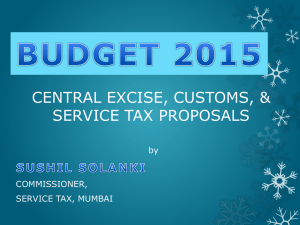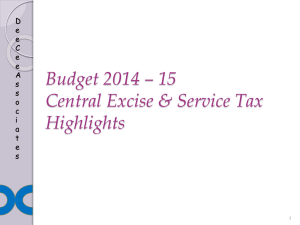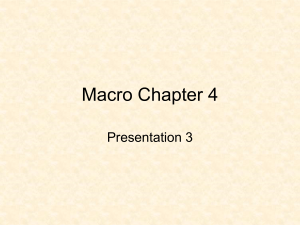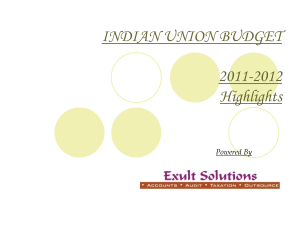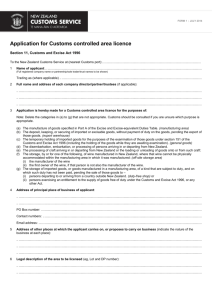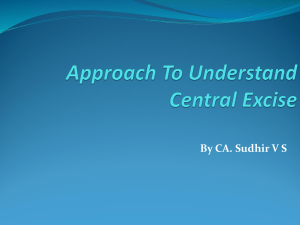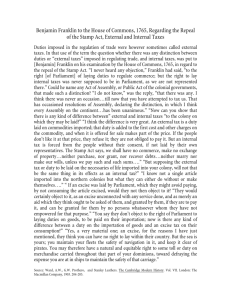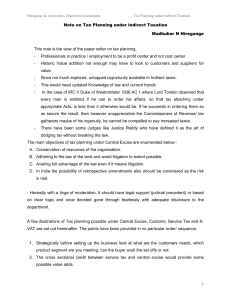Taxation Law
advertisement
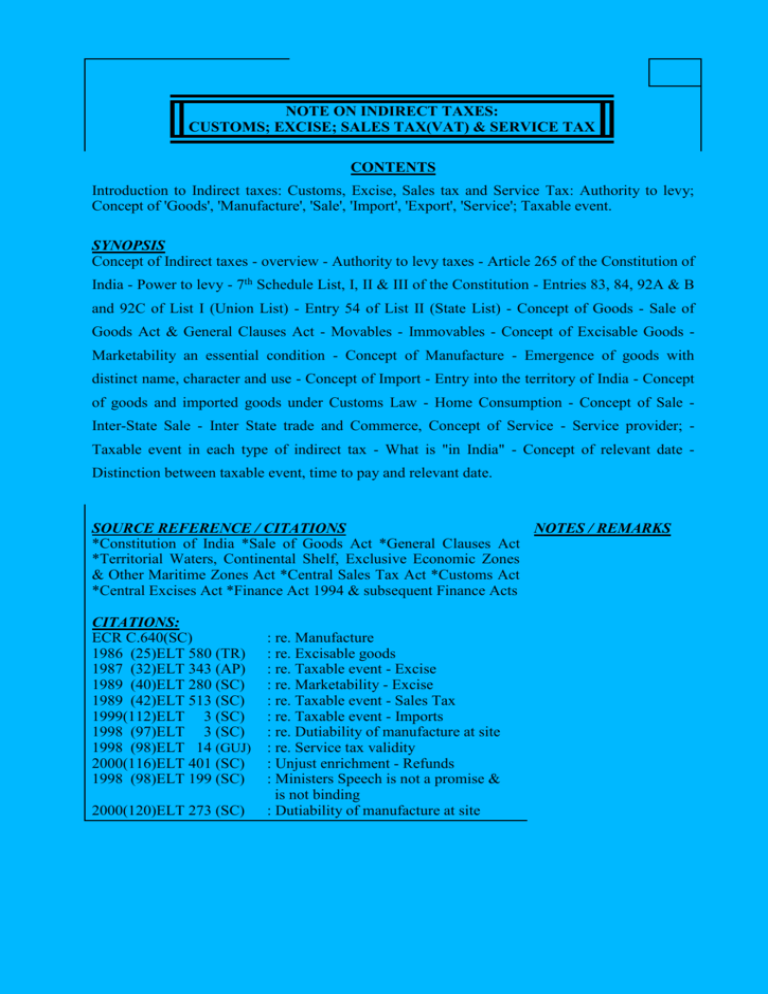
NOTE ON INDIRECT TAXES: CUSTOMS; EXCISE; SALES TAX(VAT) & SERVICE TAX CONTENTS Introduction to Indirect taxes: Customs, Excise, Sales tax and Service Tax: Authority to levy; Concept of 'Goods', 'Manufacture', 'Sale', 'Import', 'Export', 'Service'; Taxable event. SYNOPSIS Concept of Indirect taxes - overview - Authority to levy taxes - Article 265 of the Constitution of India - Power to levy - 7th Schedule List, I, II & III of the Constitution - Entries 83, 84, 92A & B and 92C of List I (Union List) - Entry 54 of List II (State List) - Concept of Goods - Sale of Goods Act & General Clauses Act - Movables - Immovables - Concept of Excisable Goods Marketability an essential condition - Concept of Manufacture - Emergence of goods with distinct name, character and use - Concept of Import - Entry into the territory of India - Concept of goods and imported goods under Customs Law - Home Consumption - Concept of Sale Inter-State Sale - Inter State trade and Commerce, Concept of Service - Service provider; Taxable event in each type of indirect tax - What is "in India" - Concept of relevant date Distinction between taxable event, time to pay and relevant date. SOURCE REFERENCE / CITATIONS NOTES / REMARKS *Constitution of India *Sale of Goods Act *General Clauses Act *Territorial Waters, Continental Shelf, Exclusive Economic Zones & Other Maritime Zones Act *Central Sales Tax Act *Customs Act *Central Excises Act *Finance Act 1994 & subsequent Finance Acts CITATIONS: ECR C.640(SC) 1986 (25)ELT 580 (TR) 1987 (32)ELT 343 (AP) 1989 (40)ELT 280 (SC) 1989 (42)ELT 513 (SC) 1999(112)ELT 3 (SC) 1998 (97)ELT 3 (SC) 1998 (98)ELT 14 (GUJ) 2000(116)ELT 401 (SC) 1998 (98)ELT 199 (SC) 2000(120)ELT 273 (SC) : re. Manufacture : re. Excisable goods : re. Taxable event - Excise : re. Marketability - Excise : re. Taxable event - Sales Tax : re. Taxable event - Imports : re. Dutiability of manufacture at site : re. Service tax validity : Unjust enrichment - Refunds : Ministers Speech is not a promise & is not binding : Dutiability of manufacture at site NARRATIVE 1. TIT BITS CONCEPT In India major indirect taxes are - Customs, Escise, Sales tax(vat)and Service Tax. Customs is on goods imported or exported into or out of India. Excise is on goods manufactured in India. Sales tax (vat)is on goods bought/sold in India. Service Tax is on value of specified services provided in India OR PROVIDED ABROAD BUT CLAIMED AS EXPENSE IN INDIA 2. AUTHORITY TO LEVY TAX i. Article 265 of the Constitution of India states "NO TAX SHALL BE LEVIED OR COLLECTED EXCEPT BY AUTHORITY OF LAW" ii. The Seventh Schedule to the Constitution, contains 3 "LISTS" known as: UNION LIST (LIST I) STATE LIST (LIST II) CONCURRENT LIST(LIST III) (97 subjects) (66 subjects) (47 subjects) List I contains subjects (known as "entries") over which only the Union Parliament can legislate upon. List II contains subjects over which only the States can legislate upon. Entries in List III are those subjects over which both the Union Parliament and also the States can legislate upon. iii. The entries relevant to Customs, Excise, Sales tax and Service tax are:(List I) 83 Duties of Customs..... 84 Duties of Excise......... 92A- Tax on Inter-State Sales 92C- Services tax 97 Any other matter not enumer-ated in List II or III including any tax not mentioned in either of those lists. (List II) 8Intoxicating liquors..... 46Tax on Agricultural income 54Tax on Intra-State Sales 60Taxes on Professions, Callings.. iv. By virtue of the above entries, the Union Parliament & State Legislatures derive their power to levy the said taxes respectively. 0806 The Arthasastra of Kautilya contains detailed and elaborate provisions of various direct & indirect taxes. In the Chapter "TREASURY, SOURCES OF REVENUE, BUDGET, ACCOUNTS AND AUDIT" the Sources of revenue are listed. They are from: Crown agricultural lands Mining & Metallurgy Animal Husbandry Irrigation Works Forests Manufacture of textiles; Salt, Alcoholic liquor Leisure activities - Courtesans, Prostitutes & entertainers Betting and gambling Customs duties Octroi & gate tolls Transaction tax Tax on butchers Countervailing duties Road cess Monopoly tax Royalties Army Maintenance tax Tax in kind by villages Surcharges Passport fees Stamping fees Port dues Land survey charges Testing fee Excort charges Ferry tax Weights & Measures tax etc. In fact, in Sub-Chapter "ACCOUNTS" a complicated form of accounts containing 10 columns for Income, 13 columns for Expenditure and 9 columns for Balances have been prescribed. 7 types of punishments are also prescribed if accounts are not maintained in the said format. (See Annexure). (Penguin Classics - English - Kautilya- The Arthasastra by L.N.Rangarajan - 1987 Rs.150 pp 868) From the various provisions as to violations & penalties etc, we may derive perverse satisfaction that our fore-fathers also faced similar problems we face today. NARRATIVE TIT BITS Page of 11 0806 3. CHARGING STATUTES GROUCHO MARX was once arrested for nonpayment of income tax. When the Judge observed why a rich man like Groucho should not pay tax with a smile, Groucho replied, "I did try to pay the tax with a smile but they insist on cash payment". i. Levy and Collection of the taxes are exercised through the Statutes called 'Acts'. Statutes also specify the maximum rates called "tariff rates". They also confer the required powers to the tax-collecting authorities (the Two things are certain in this world: executive) to prescribe the procedures Death and taxes. of collection, refund, exemption, - BENJAMIN FRANKLIN penalty, appeal etc. ii. Such authorities (normally called the 'Department') frame the necessary rules & regulations of procedures. They also issue directions, clarifications and amendments through 'Notifications', 'Circulars' etc. When goods at the time of "taxable event" were wholly exempt from duty, are they chargeable to duty if any, at the "relevant time" for payment ? This was a controversial issue. But it is now a well settled law through Supreme Court Judgements. iii. Down the line, the implementing fieldauthorities (known as Commissionerate, Range, Circle etc) issue "Trade Notices", "Public Notices" etc, giving specific procedures or clarifications appropriate to their jurisdiction. In the case of Customs duty on imports, duty shall be at the rates prevailing as on the date of Bill of Entry or "entry inwards" whichever is later, when the Bill of Entry is for "home consumption", even if they were wholly exempt at the time of entry into Indian territory. iv. The principal enactments regarding the In the case of Excise, the duty shall be as on the indirect taxes are the date of clearance or removal of the goods from * Customs Act; the place of manufacture, even if the goods at * Customs Tariff Act; * Central Excises Act; the time of manufacture (ie. Taxable event) * Central Excise Tariff Act; were wholly exempt. * Central Sales Tax Act; * General Sales Tax /VAT Acts of each State; * Finance Acts since 1994 regarding Service Tax v. vi. - - In the case of "Sale on approval or return", the Sales tax chargeable will be as on the date of In addition to the above there are change of ownership (ie. Title) and not as on the several other enactments levying similar date of despatch or delivery. types of taxes. In the case of "deemed sale" contracts such as The same goods can attract different Works Contract, the relevant date is the date of types of Customs duty / Excise duty / appropriation of goods towards the contract. Sales tax etc. For example - Imported goods can attract "Basic In India there is a practical difficulty in Customs Duty", "Additional duty of implementation of a full fledged Value Added Customs" & "Special Additional Tax (VAT) system. This is so, due to Sales tax Customs Duties", "Surcharge" etc. being a State subject while Central Excise is a (besides these, 'Anti-dumping duty', Union Subject. From 1.4.2003 many States 'Counterveiling duty' & 'Safeguard duty' have implemented VAT for sales tax. Already, can also be there as per WTO norms). the Central Govt. has implemented VAT for Goods manufactured may attract "Basic Central Excise purposes called "CENVAT" Excise Duty", "Special Excise duty", (and also for Service Tax) "Additional Excise duties" etc. Similarly there can be Sales tax, Purchase tax, Surcharge on Sales tax, Turnover Tax, Additional Sales tax etc. NARRATIVE TIT BITS Page of 11 1204 4. GOODS i. Only "goods" attract Customs or Excise or Sales tax depending on the nature of event ie. 'Imports' or 'Exports', 'Manufacture', 'Sale' etc. ii. There are several interesting aspects regarding "territory", "territorial Waters", "Exclusive Economic Zone" etc. To understand these correctly one has to refer to provisions of several conventions, codes, agreements etc. Eg: UN Convention on the Law of the Sea. The word 'goods' has to be understood International Sea bed Treaty. with reference to each type of tax, as Conventions on Territorial Sea and Contiguous per the provisions of that Act. Zone, the High Seas, the Continental Shelf, For example:Exclusive Economic Zones, Sovereignty over the Air etc. According to the Customs Act, Sec. 2(22), "Goods" includes Some of the interesting but not much known facts: a) Vessels, Aircrafts and Vehicles; - India has been accorded 'pioneer status' in seab) Stores; bed mining. c) Baggage; d) Currency & negotiable instruments; & - India has been allocated 1,50,000 square e) Any other kind of moveable property. kilometers in the Sea-bed of Central Indian This definition is applicable only for Customs duty purposes on imports & exports. - iii. iv. Since 'goods' are not defined in the Central Excise enactment, the definition given in the Sale of Goods Act is applicable for excise purposes. According to Sale of Goods Act, Sec. 2(7) "Goods" means every kind of moveable property other than actionable claims & money; and includes stocks & shares, growing crops, grass & things attached to or forming part of the land which are agreed to be severed before sale or under the contract of Sale. - The General Clauses Act, 1897 Sec. 2(36) states "moveable property" shall mean property of every description except immoveable property. The same Act Sec. 2(26) defines immoveable property:"immoveable property" shall include land, benefit to arise out of land, and things attached to earth, or permanently fastened to any thing attached to earth. v. - Thus it may be seen that while 'currency and negotiable instruments' are 'goods' for Customs duty purposes, they are not goods for the purposes of Excise levy or Sales tax. Ocean and Indian Claim has been registered in 1987. Each pioneer is required to pay $2,50,000 fee to the Preparatory Commission for registration. Each pioneer should pay $2,50,000 to the International Sea-Bed authority for mining contract + $ 1 million a year from the year of approval. The Sea-bed allotted to India contains 3,000 billion tonnes of 'potato' nodules containing copper, nickel, cobalt, zinc, lead, vanadium etc. India can become an exporter of these metals by mining our allocated area. Some of the areas of the sea allocated to India contain 21 kg of nodules per square metre. These nodules are at an average depth of 3000 6000 metres. (Source: International Law by Dr. S.K. Kapoor Central Law Agency 8th Edition. 1990 Rs.110/pp 832; The International Law of the Sea Progress Publishers, Moscow, 1988 ISBN 5-01000454-2 pp 255; Public International Law by M.P. Tandon - Allahabad Law Agency, 11th Edition. 1991, Rs.90/- pp 474). According to our Territorial Waters, Continental Shelf, Exclusive Economic Zone & Other Maritime Zones Act, 1976, the territorial waters extend to 12 nautical miles in the sea. Our Exclusive Economic Zone extends to 200 nautical miles. Hence any exploration activity, eg. Oil drilling, outside 12 nautical miles is technically not in Indian Territory. However, once we have erected an installation in this Exclusive Economic Zone, Ministry of External Affairs (MEA) can issue a gazette notification declaring such installation & 500 metres around it as part of our territory. This is permitted under Article 5.3 of the Territorial Sea & The Contiguous Zones of U.N. Convention dt. 10.9.1964 (Source: Basic Documents in International Law: OXFORD-4th Edn. By Ian Brownlie ISBN 0-19-876381 - 6) NARRATIVE TIT BITS Page of 11 0806 5. TAXABLE GOODS & TAXABLE EVENT i. Not all "goods" are taxable. They have to be 'specified' goods ie., specified to levy of tax under each statute. Further they are charge-able to tax only on the happening of an 'event' specified in the relevant statute. ii. iv. v. vi. i. incidental or ancillary to the completion of a manufactured product, and ii. which is specified in relation to any goods in the Section or Chapter notes of the Schedule to the Central Excise Tariff Act, 1985 (5 of 1985) as amounting to manufacture, The 'taxable events' are as follows: - iii. Section 2 (f) of Central Excise Act defines "manufacture" as follows: "manufacture" includes any process,- "Import" or "Export" for Customs "Manufacture" or "Production" for Excise "Sale" or "Deemed Sale" for Sales tax rendering of service for service tax and the word "manufacture" shall be construed accordingly and shall include not only a person who employs hired labour in the production or manufacture of excisable goods, but also any person who engages in their production or manufacture on his own account; To attract tax, the goods should be 'Specified goods' in the respective tariff. For example "Electrical Energy" are "goods" but not "excisable goods" as they are not specified in the Central Excise Tariff. It would be useful to know the exact text of the 'entries' regarding the indirect taxes in the To know whether a particular item is Seventh Schedule to the Constitution of India. specified goods or not, one should be thorough with the appropriate tariff LIST I - UNION LIST classification. ENTRY 83 Duties of Customs including export duties. Customs duties can be charged only on 84 Duties of Excise on tobacco & other goods goods imported or exported. The manufactured or produced in India excepttaxable event is "Import" or "Export". a) alcoholic liquors for human Import or Export is said to happen when consumption; the goods enter into or exit out of India. b) opium, Indian hemp & other narcotic For Eg. Customs Act, Sec. 2(25) states drugs and narcotics, "Imported goods" means any goods brought but including medicinal and toilet into India from a place outside India but preparations containing alcohol or any does not include goods which have been substance included in sub-paragraph (b) cleared for home consumption; of this entry. Excise duty can be charged only on 'excisable goods', 'manufactured' in India. Thus the taxable event is 'manufacture'. The word "manufacture" has been ill defined in the Central Excise Act. Courts have held that 'manufacture' does not mean mere processing but emergence of 'excisable goods' with distinct name, character and use different from that of the goods used as inputs; also they should be capable of being bought and sold. ENTRY 92A Taxes on the sale or purchase of goods other than newspapers, where such sale or purchase takes place in the course of interState trade or Commerce. 92B Taxes on the consignment of goods (whether the consignment is to the person making it or to any other person), where such consignment takes place in the course of inter-State trade or commerce. 97 Any other matter not enumerated in List II or List III including any tax not mentioned in either of those lists. NARRATIVE TIT BITS Page of 11 0806 In certain instances "upgradation" does not LIST II - STATE LIST amount to "manufacture" though what goes ENTRY in is distinctly different from what comes 51 Duties of Excise on the following goods out. For example, upgradation of Computer manufactured or produced in the State and does not amount to manufacture of a new countervailing duties at the same or lower Computer vide CBEC circular 454/20/99 rates on similar goods manufactured or CX dt. 12.4.1999. produced elsewhere in India :Under Central Excise "manufacture" includes any process specified in any Section or Chapter Note of Excise Tariff as "amounting to manufacture". For example under Note 5 of Chapter 30 of the Central Excise Tariff, for goods falling under 30.03, even labeling or re-labeling container intended for consumer and re-packing bulk to retail packs shall amount to manufacture. a) alcoholic liquors for human consumption; b) opium, Indian hemp & other narcotic drugs and narcotics, but including medicinal and toilet preparations containing alcohol or any substance included in sub-paragraph (b) of this entry. 54 Taxes on the sale or purchase of goods other "Marketability" is yet another criteria to than newspapers, subject to the provisions determine excisable goods. For example of Entry 92-A of List I. molten sulphur, reformer-gas are not excisable goods. They have only transient RATE OF TAX The rate of tax in each type of tax life and are not capable of being bought and i. depends upon the 'relevant date' for sold as such. determination of the rate of tax. Similarly emergence of an item as a part & Under the respective enactments parcel of immovable property cannot be ii. 'relevant dates' are specified for each subject to excise. For example, component type of transaction. For example: parts of a lift are excisable goods when manufactured. But 'lift' itself is not Relevant date for imports for home excisable since it comes into existence as a consumption is the date of filing the Bill of part of immovable property, namely a Entry or "entry inwards" whichever is later. building. For warehoused imports, the relevant date is the date of physical removal of the goods There has been a controversial decision in from the warehouse. regard to Plant & Machinery at site arising out of a Supreme Court decision in Sirpur Relevant date for excise duty is the date on Paper Mills case [1998 (97) ELT 3 (SC)] & which goods are removed or cleared from Triveni Engineering & Industries case the factory). [2000 (120) ELT 273 (SC)] Relevant date for Sales Tax is "sale" ie., the vii. Sales tax/VAT is chargeable on goods time of passing of the title or ownership only when a 'sale' takes place. Transfer from the buyer to the seller. In the case of of title ie., change in ownership, is the goods forming part of a 'Works Contract', essential aspect of a sale. Thus transfer the relevant date is the date of "deemed of goods from one branch to another sale" ie., when the goods are appropriated does not attract Sales tax. Similarly into the works contract. there cannot be sales tax on goods given to a job-worker for processing and return. State Sales tax is chargeable on sales within a State while Central Sales tax is chargeable for Inter-State sale. However it should be noted that by 46 th Amendment to the Constitution of India, the concept of "deemed sale" has been incorporated. This brings into the ambit of sales tax, transactions which are not strictly "sale". (Eg. Lease, hire, stock transfer, works contract etc.) But in all these cases, the tax can be only on the value of goods. NARRATIVE Page of 11 0806 6. SERVICES: Tax on Services rendered in India was introduced by Finance Act, 1994 and each year the types of taxable services have been expanding. An uniform rate of 5% was in vogue on all types of taxable services to start with. The service provider is the assessee for this tax except in a few specified cases. It is permitted to be recovered from the service user by the service provider. The rates are revised UPWARDS EACH YEAR with facility of CENVAT credit from Sept 2004. 7. COLLECTION AUTHORITIES i. Customs, Central Excise & Service tax is collected by the officials of Central Excise & Customs of the Department of Revenue, Ministry of Finance of the Union Government. Central Board of Excise & Customs (CBEC) is the administrative authority. 8. ii. Intra-State Sales tax /VAT are collected by the Sales tax authorities of the States. iii. Inter-State Sales tax (CST) are also collected by the same State Sales tax authorities (through delegated legislation) from where the goods are sold. TIME TO PAY TAX i. Whatever be the 'taxable event', the time to pay the tax is different in each type of tax. The respective enactments specify the time of payment of tax. ii. Customs duty on imports is payable at the time of taking delivery after the completion of "Assessment" for home consumption. "Assessment" is defined in the Customs Act, Sec.2(2): "assessment" includes provisional assessment, re-assessment and any order of assessment in which the duty assessed is nil; In other words 'assessment' means determination of duty including 'nil' duty. 9. iii. Excise duty is payable on 5th of each month on removal or 'clearance' in the earlier month, of the manufactured goods from the place of manufacture. This includes captive consumption or use also. iv. Sales tax is payable on or before a 'specified date' in a month for the sales effected in the preceding month. The 'specified date' is determined by the State Governments. (Normally 20th of each month) v. Service Tax is payable monthly or quarterly as specified only on cash collection basis OVERVIEW OF INDIRECT TAXES TYPE OF TAX Tax Is On Specified Taxable Event CENTRAL EXCISE SALES TAX / VAT SERVICE TAX IMPORTS (CUSTOMS) EXPORTS CUSTOMS) Goods Goods Services Goods Goods Manufacture Sale (Or Deemed Sale) Rendering Service Import Export Specified Time By The States Quarterly/ monthly as Specified Clearance For "Home Consumption" "Let Export" As on date of sale or deemed sale As per Finance Act As on date of Bill of Entry or "Entry Inward" whichever is later As on date of export 5th Time Of Payment Rate of Tax 10. of each month except March (31st March) As at the time of clearance from place of manufacture CONCLUSION Each type of indirect tax should be understood with reference to the specific enactments. The essential feature of dealing with indirect taxes be any one should be that of strict compliance with the statutory requirements. The tendency to look for loopholes for avoidance or circumventing the tax should be avoided. The motto should be 'Not a paise more, not a paise less'. 0806 VALUE ADDED TAX (VAT) Page of 11 1. Almost all the countries in the world charge tax on sale or purchase of goods and services. Only the terminologies differ eg. Transaction Tax, Consumption Tax, Sales Tax, Purchase Tax, Services Tax etc. The principle behind this taxation is that the burden is ultimately on the consumer. Since the tax is not collected by the Government directly from the consumer, it is termed "indirect tax". ie., Government gets the tax through an "intermediary" (typically a manufacturer or trader) who charges the tax to the ultimate consumer. 2. The same product may be sold several times, commencing from the manufacturer / importer to the ultimate consumer through wholesalers, distributors, retailers etc. who are intermediaries in the chain. Obviously each of the intermediary will add his margin (called "value addition"). 3. If tax is charged on each sale of the same product at each stage, then this will lead to "cascadence" of tax (tax on tax again). The following is the example: Cost of product Margin Price Tax @ 10% Price to buyer Manufacturer (A) 1000 500 1500 150 1650 Distributor (B) 1650 350 2000 200 2200 Wholesaler (C) 2200 300 2500 250 2750 Retailer (D) 2750 250 3000 300 3300 Consumer (E) 3300 4. In the above example the total tax ultimately borne by the consumer is Rs.900 (150 + 200 + 250 + 300) on a total product value (including margins of Rs.2400. Much worse is that the consumer really does not know that the product has suffered a total tax of Rs.900. 5. It will also be noticed in the given example that out of Rs.900 tax, only Rs.240 (10% of Rs.2400) belongs to the value of goods + value addition. Out of the balance Rs.660, the tax on tax already paid Rs.110 as follows: 10 % of Rs.150 in B 10 % of Rs.350 in C 10 % of Rs.600 in D 15 35 60 110 Another Rs.550 is tax on the value of goods already charged to tax. 6. From the economist's point of view this cascadence is not desirable. In all fairness value of an item taxed once should not be charged to tax again excepting the value added portion which has not suffered tax yet. 7. This is the background of introduction of a system called "Value Added Tax" known as VAT. Under this system at each stage of transaction, only the value addition in the transaction is taxed in effect. However, to protect the confidentiality of the value addition (margin), the method adopted is that of "Input Tax Reimbursement System". Under this methodology, the consumer will know what is the exact 'tax' element of his purchase but will not know the value additions (margins) built in the earlier stages by the 'intermediaries'. 8. Illustration of VAT: Manufacturer (A) Distributor (B) Page of 11 Wholesaler (C) Retailer (D) Consumer (E) Input Cost Profit Margin Total Cost Less: Input Tax Credit Net Price Tax @ 10% Gross Price 1000 500 1500 1650 350 2000 2035 300 2335 2365 250 2615 NA 1500 150 1650 150 1850 185 2035 185 2150 215 2365 215 2400 240 2640 2640 Under the above example it will be found that at each stage, the seller "reimburses" himself to the extent of "input tax" suffered by him and only the balance is given to the government. Thus the government gets a total tax of Rs.240 as follows: From From From From A B (185 – 150) C (215 – 185) D (240 – 215) Total Rs. 150 Rs. 35 Rs. 30 Rs. 25 Rs. 240 In the above method, the ultimate consumer "E" knows that the total product value is Rs.2400 and tax on the same is Rs.240/-. He does not know the margins built by each earlier seller. 9. This VAT system is prevalent in more than 150 countries. In India, as per our constitution, sales tax is a "State" subject and not a "Union" subject. Each "State" has to legislate VAT law and implement the same. Further, as per our constitution, tax on 'inter-state' sales belongs to the State from which the goods originate. This means that the State to which the goods are sent cannot extend VAT credit to the buyer as the tax has been collected by the originating State. 10. Consequently the problem of implementation of VAT in India has become a legal nightmare. However, many States have already implemented VAT. There are also steps afoot to eliminate (bring zero tax) tax on inter-state sales. As this means loss of revenue to the States from which the goods originate, Central Government is grappling with this as to the means of compensating the same. . Page of 11
